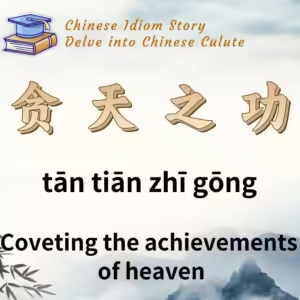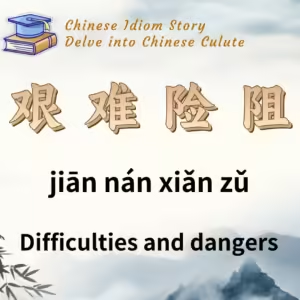
Chinese Idiom: 贪天之功 (Tan Tian Zhi Gong)
English Translation: Coveting the achievements of heaven
pīn yīn: tān tiān zhī gōng
Idiom Meaning: This idiom refers to the act of taking credit for the accomplishments of others or for collective efforts, reflecting a sense of dishonesty and a lack of integrity.
Historical Source: From Zuo Zhuan: Year 24 of Duke Xi.
Idiom Story:
After Duke Wen of Jin (Zhong’er) ascended to the throne, he rewarded the ministers and officials who had supported him during his 19 years of exile. Those with significant contributions received generous fiefs, while those with lesser achievements were also honored. However, one individual, the nobleman Jie Zitui, was overlooked despite his considerable efforts.
During their time in exile, Jie Zitui had shown remarkable loyalty. When Zhong’er and his companions were starving while passing through the state of Wei, Jie Zitui selflessly cut a piece of flesh from his own thigh to provide them with a meal. Yet, despite his sacrifice, he was not recognized or rewarded upon Zhong’er’s return to power, leading many to speak out on his behalf.
In stark contrast, Jie Zitui remained silent about the lack of recognition. He believed that seeking rewards for acts of kindness was undignified. He expressed his views by saying, “There are nine sons of Duke Xian, and now only Zhong’er remains. The other rulers, Duke Hui and Duke Huai, have committed many wrongdoings and are long overdue for removal. It is heaven’s arrangement that the virtuous ruler, who can inherit the throne, is Zhong’er. To claim credit for a small contribution is to deceive oneself.”
He further criticized those who covet recognition, stating, “Stealing someone else’s wealth is called theft; how much more disgraceful is it to claim the achievements of heaven as one’s own?” Jie Zitui viewed such behavior as reprehensible and sought to distance himself from those who acted in such a manner.
Initially, Jie Zitui’s mother did not understand his position and urged him to seek recognition from Duke Wen, fearing that if he continued to be overlooked, he would only have himself to blame. Jie Zitui calmly replied, “If others are wrong, is it not a mistake to imitate them? Moreover, how could I adopt the same immoral behavior I have condemned?”
After making this decision, Jie Zitui and his mother retreated to the Mian Mountains (in modern-day Shanxi) and vowed to live in seclusion. Eventually, Duke Wen, realizing their absence, sent people to search for them. When they could not be found, he ordered the mountains to be set on fire. Jie Zitui and his mother perished in the flames. In memory of Jie Zitui’s loyalty and sacrifice, Duke Wen declared that the taxes from the land of Mian should be dedicated to his memory, lamenting, “This is to acknowledge my mistake and honor the virtuous.”
From this story, the phrase “贪天之功” emerged, summarizing Jie Zitui’s disdain for those who falsely take credit for the achievements of others or attribute their success to luck or fate.






